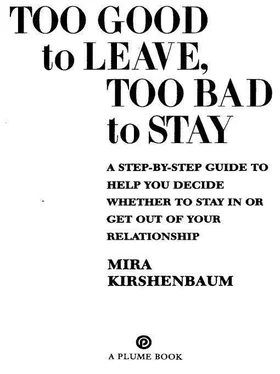Kirshenbaum, Mira - Too Good to Leave, Too Bad to Stay
Здесь есть возможность читать онлайн «Kirshenbaum, Mira - Too Good to Leave, Too Bad to Stay» весь текст электронной книги совершенно бесплатно (целиком полную версию без сокращений). В некоторых случаях можно слушать аудио, скачать через торрент в формате fb2 и присутствует краткое содержание. Жанр: Психология. Описание произведения, (предисловие) а так же отзывы посетителей доступны на портале библиотеки ЛибКат.
- Название:Too Good to Leave, Too Bad to Stay
- Автор:
- Жанр:
- Год:неизвестен
- ISBN:нет данных
- Рейтинг книги:3 / 5. Голосов: 1
-
Избранное:Добавить в избранное
- Отзывы:
-
Ваша оценка:
- 60
- 1
- 2
- 3
- 4
- 5
Too Good to Leave, Too Bad to Stay: краткое содержание, описание и аннотация
Предлагаем к чтению аннотацию, описание, краткое содержание или предисловие (зависит от того, что написал сам автор книги «Too Good to Leave, Too Bad to Stay»). Если вы не нашли необходимую информацию о книге — напишите в комментариях, мы постараемся отыскать её.
Too Good to Leave, Too Bad to Stay — читать онлайн бесплатно полную книгу (весь текст) целиком
Ниже представлен текст книги, разбитый по страницам. Система сохранения места последней прочитанной страницы, позволяет с удобством читать онлайн бесплатно книгу «Too Good to Leave, Too Bad to Stay», без необходимости каждый раз заново искать на чём Вы остановились. Поставьте закладку, и сможете в любой момент перейти на страницу, на которой закончили чтение.
Интервал:
Закладка:
There was a period when this issue really felt like a deal breaker to this Texan. He’d spent his whole life anticipating being married to a woman who would be a wonderful homemaker. I asked John if he could let go of his expectations. That possibility had actually never occurred to him before. He said he’d need a week to think about it.
When he came back, he said, “You know, I thought to myself if this works, it’ll be the easiest thing I’ve ever done. Let me see if I can just take a big breath and let go of the stuff I had in my head about Beth doing all the work around the house. I couldn’t believe it but it worked.”
It’s not always so easy to let go, and the odds are that you’ve already tried it and it hasn’t worked for you, but if you haven’t tried to let go of either paying attention to or being bothered by this thing that’s making your relationship too bad to stay in, then it’s worth trying now. Give it a week or two and see what happens. Then what’s your answer to question #17? Can you let go? Here’s the guideline:
GUIDELINE #17
If you can really let go of the problem that’s most making you feel you want to leave your partner, if you can stop paying attention to it or stop letting it bother you, there’s a real chance this relationship is too good to leave. Quick take: In a relationship with a future, people can let go of the problems they can’t solve.
People often talk about how you can’t change someone else, you can only change yourself. That’s what this guideline refers to. But the reality is that this kind of letting go is a lot harder to come by than we’d like. Most of the time, after we’ve tried to let go and failed, we’re forced to confront our need for the other person to change. As long as your partner’s willing to acknowledge that the problem exists, as long as he proclaims a willingness to change, there’s hope. But can he change?
STEP #18: CHANGE AND THE WORLD CHANGES WITH YOU
The answer to the question “who are you?” is that we are all the things we are now and all the things we can be in the future. This is what I often say to patients when I ask them to make a change and they say, “I can’t because it’s not who I am.” But you don’t know who your partner is to the extent that you don’t know who he can be in the future. And the only way you can find that out is to try and see how much he can change.
Julia’s Story
It was one of those tragic cases I’ve seen where someone is painfully stuck in relationship ambivalence for fifteen years. That’s how long Julia had spent feeling horribly dissatisfied with her husband, Oscar. She’d done things to half leave the relationship, things like renting a studio of her own to work in or talking to lawyers. But she’d stayed and stayed, making plans for their future together, plans she looked forward to and dreaded at the same time.
They were a cultured, intellectual couple. She was a classical musician, not tremendously talented by her own admission, which was part of the problem, because if she’d felt more talented she’d have felt more entitled to have her own life as a musician. But that was hard because Oscar was a genius. He was a prize-winning world-class scientist and businessman.
You’ll have to believe me when I tell you that Oscar was both one of the most frustrating, infuriating, exasperating people around and at the same time rather sweet and charming. I know this doesn’t sound like it makes sense, but here’s an example.
He’d come home from work, interrupt Julia in the middle of whatever she was doing, turn off her music, because he’d forgotten for the millionth time her million requests to not intrude on her when he came home. And yet, his intrusions were always for the sake of telling her an amusing story or about some small triumph that had occurred during the day.
The tragedy was that Oscar desperately wanted to connect and yet was unable to connect. His slightest utterance had the quality of a formal lecture by an Old World professor. He was boring, incredibly long winded, and insensitive to the point where he never looked at anyone he was talking to.
Was this relationship too good to leave for Julia, or too bad to stay in?
In His Own Sweet Way. It might sound amazing, given Oscar’s air of imperviousness, but he knew there was something wrong with how he acted, and the sweet part of him was sincerely willing to change. But his ability to change was limited and frankly weird. He was to personal growth what an extremely brilliant parrot would be to learning English. He could change very fast, but only when I presented his task in almost mathematical form, and then he’d change completely but only in that one narrow respect.
For example, everyone in his family complained passionately about the way he monopolized the conversation no matter how many people were in the room. Nothing could get him to change this until I presented him with the following little formula: Divide the amount of time available by the number of people in the room—that’s the percent of time you can talk and the rest of the time you have to listen. If there are two people in the room, you can talk half the time; if there are four people you can only talk a quarter of the time; and so on. He got it and he did it. But not one single other thing would change until I’d come up with another mathematical formula.
What should I do, Julia asked, stay or leave?
Here’s the question I asked Julia:
Diagnostic question #18. As you think about your partner’s problem that makes your relationship too bad to stay in, does he acknowledge it and is he willing to do something about it and is he able to change?
How can you tell if your partner is able to change? There are many ways, and it’s important to understand them. Oscar had his own unique style of changing. It was weird, but it was change.
You see, asking if an individual can change means asking what an individual needs to change. One person might simply need to be asked. Oscar needed extremely precise, concrete instructions, the kinds of things he used every day as a scientist. Other people need other things. Some examples follow.
Knowing You Care. A lot of people need the sense that you really care about what you’re asking for. You’re probably surprised at this. How can she not know you care if the two of you have done nothing but fight about this for years? Well, it’s a mystery to me, too. And I’ve resigned myself to knowing that I’ll probably grow old and die without ever solving this mystery.
But from the perspective of my years of clinical experience, although I don’t know why this is true, I know it’s a fact that people can spend decades yelling and crying and fighting over an issue and their partner will still say in all honesty, “I never really knew how much it mattered to you.”
So before you can say your partner can’t change, you’ve got to make sure your partner knows how much the issue matters to you—not based on your thinking he should know, but based on his proving he does know. Ask him: on a scale of 1 to 10 how important do you think this is to me? If he doesn’t say “10,” you know he doesn’t know how important it really is to you.
Motivation. Other people need adequate motivation. But isn’t knowing you care enough? It should be, in a perfect world, but in this imperfect world of ours change is painful and scary. And sometimes it’s hard for people to change even with all the motivation in the world. At least with adequate motivation the likelihood of change increases.
Читать дальшеИнтервал:
Закладка:
Похожие книги на «Too Good to Leave, Too Bad to Stay»
Представляем Вашему вниманию похожие книги на «Too Good to Leave, Too Bad to Stay» списком для выбора. Мы отобрали схожую по названию и смыслу литературу в надежде предоставить читателям больше вариантов отыскать новые, интересные, ещё непрочитанные произведения.
Обсуждение, отзывы о книге «Too Good to Leave, Too Bad to Stay» и просто собственные мнения читателей. Оставьте ваши комментарии, напишите, что Вы думаете о произведении, его смысле или главных героях. Укажите что конкретно понравилось, а что нет, и почему Вы так считаете.












